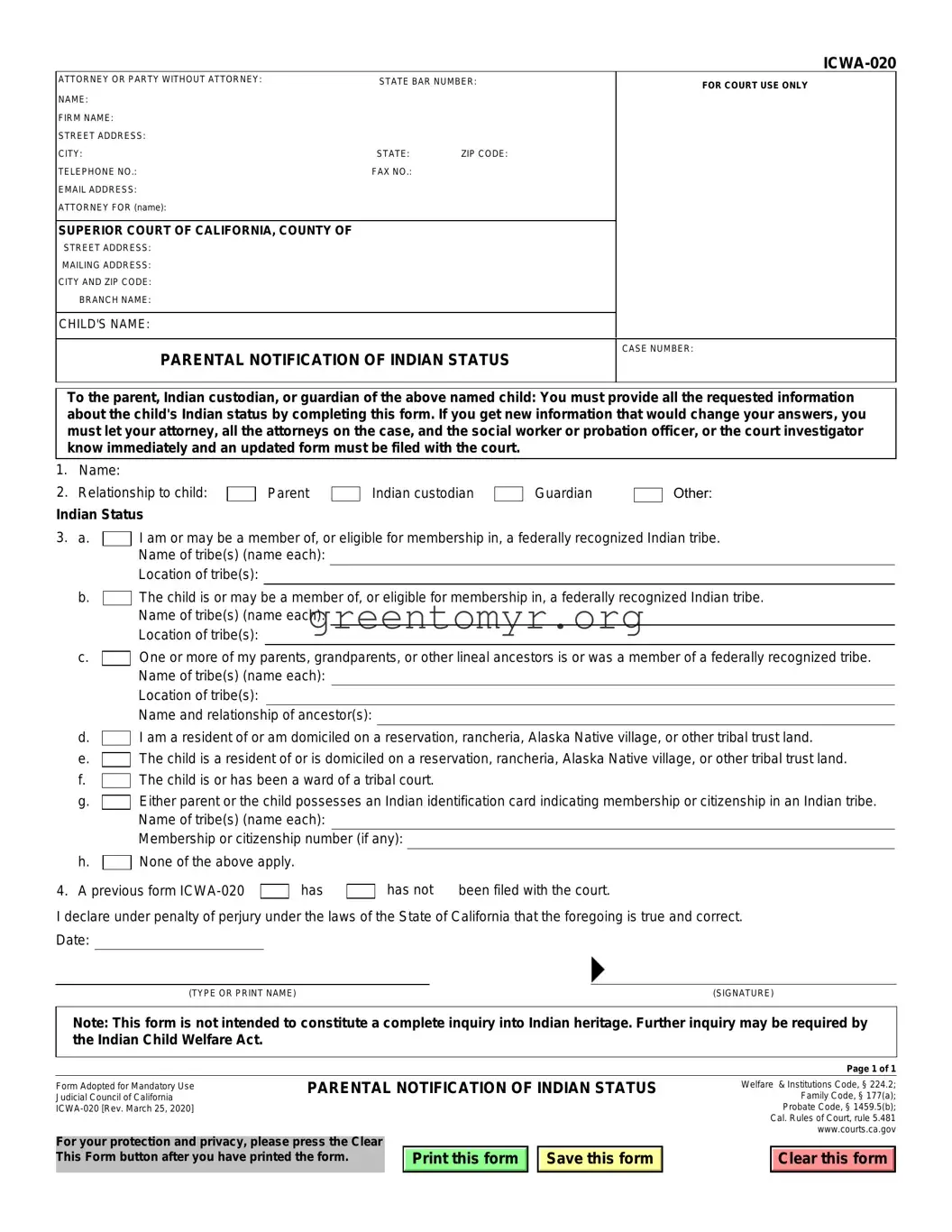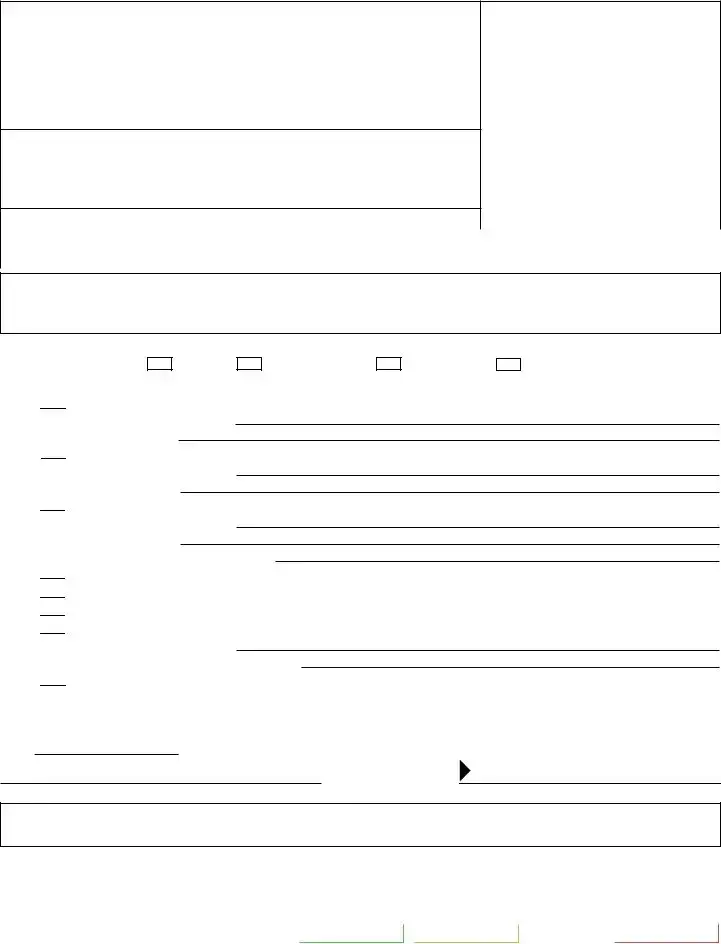3. a.
ICWA-020
ATTORNEY OR PARTY WITHOUT ATTORNEY: |
STATE BAR NUMBER: |
FOR COURT USE ONLY |
|
|
|
NAME: |
|
|
|
FIRM NAME: |
|
|
|
STREET ADDRESS: |
|
|
|
CITY: |
STATE: |
ZIP CODE: |
|
TELEPHONE NO.: |
FAX NO.: |
|
|
EMAIL ADDRESS: |
|
|
|
ATTORNEY FOR (name): |
|
|
|
SUPERIOR COURT OF CALIFORNIA, COUNTY OF
STREET ADDRESS:
MAILING ADDRESS:
CITY AND ZIP CODE:
BRANCH NAME:
CHILD'S NAME:
PARENTAL NOTIFICATION OF INDIAN STATUS |
CASE NUMBER: |
|
|
|
To the parent, Indian custodian, or guardian of the above named child: You must provide all the requested information about the child's Indian status by completing this form. If you get new information that would change your answers, you must let your attorney, all the attorneys on the case, and the social worker or probation officer, or the court investigator know immediately and an updated form must be filed with the court.
1.Name:
2.Relationship to child:
Indian Status

 I am or may be a member of, or eligible for membership in, a federally recognized Indian tribe.
I am or may be a member of, or eligible for membership in, a federally recognized Indian tribe.
Name of tribe(s) (name each):
Location of tribe(s):
b. The child is or may be a member of, or eligible for membership in, a federally recognized Indian tribe. Name of tribe(s) (name each):
The child is or may be a member of, or eligible for membership in, a federally recognized Indian tribe. Name of tribe(s) (name each):
Location of tribe(s):
c. One or more of my parents, grandparents, or other lineal ancestors is or was a member of a federally recognized tribe. Name of tribe(s) (name each):
One or more of my parents, grandparents, or other lineal ancestors is or was a member of a federally recognized tribe. Name of tribe(s) (name each):
Location of tribe(s):
Name and relationship of ancestor(s):
d. I am a resident of or am domiciled on a reservation, rancheria, Alaska Native village, or other tribal trust land.
I am a resident of or am domiciled on a reservation, rancheria, Alaska Native village, or other tribal trust land.
e. The child is a resident of or is domiciled on a reservation, rancheria, Alaska Native village, or other tribal trust land.
The child is a resident of or is domiciled on a reservation, rancheria, Alaska Native village, or other tribal trust land.
f. The child is or has been a ward of a tribal court.
The child is or has been a ward of a tribal court.
g. Either parent or the child possesses an Indian identification card indicating membership or citizenship in an Indian tribe. Name of tribe(s) (name each):
Either parent or the child possesses an Indian identification card indicating membership or citizenship in an Indian tribe. Name of tribe(s) (name each):
Membership or citizenship number (if any):
h. None of the above apply.
None of the above apply.
4. A previous form ICWA-020 |
|
has |
|
has not |
been filed with the court. |
|
|
I declare under penalty of perjury under the laws of the State of California that the foregoing is true and correct. Date:
(TYPE OR PRINT NAME) |
(SIGNATURE) |
Note: This form is not intended to constitute a complete inquiry into Indian heritage. Further inquiry may be required by the Indian Child Welfare Act.
|
|
|
|
|
|
|
Page 1 of 1 |
Form Adopted for Mandatory Use |
PARENTAL NOTIFICATION OF INDIAN STATUS |
Welfare & Institutions Code, § 224.2; |
Judicial Council of California |
|
|
|
|
|
|
Family Code, § 177(a); |
ICWA-020 [Rev. March 25, 2020] |
|
|
|
|
|
|
Probate Code, § 1459.5(b); |
|
|
|
|
|
|
|
Cal. Rules of Court, rule 5.481 |
|
|
|
|
|
|
|
www.courts.ca.gov |
For your protection and privacy, please press the Clear |
|
|
|
|
|
|
This Form button after you have printed the form. |
|
Print this form |
|
Save this form |
|
Clear this form |
|
|
|
|
|
|
|
|



 I am or may be a member of, or eligible for membership in, a federally recognized Indian tribe.
I am or may be a member of, or eligible for membership in, a federally recognized Indian tribe. The child is or may be a member of, or eligible for membership in, a federally recognized Indian tribe. Name of tribe(s)
The child is or may be a member of, or eligible for membership in, a federally recognized Indian tribe. Name of tribe(s)  One or more of my parents, grandparents, or other lineal ancestors is or was a member of a federally recognized tribe. Name of tribe(s)
One or more of my parents, grandparents, or other lineal ancestors is or was a member of a federally recognized tribe. Name of tribe(s)  I am a resident of or am domiciled on a reservation, rancheria, Alaska Native village, or other tribal trust land.
I am a resident of or am domiciled on a reservation, rancheria, Alaska Native village, or other tribal trust land. The child is a resident of or is domiciled on a reservation, rancheria, Alaska Native village, or other tribal trust land.
The child is a resident of or is domiciled on a reservation, rancheria, Alaska Native village, or other tribal trust land. The child is or has been a ward of a tribal court.
The child is or has been a ward of a tribal court. Either parent or the child possesses an Indian identification card indicating membership or citizenship in an Indian tribe. Name of tribe(s)
Either parent or the child possesses an Indian identification card indicating membership or citizenship in an Indian tribe. Name of tribe(s)  None of the above apply.
None of the above apply.